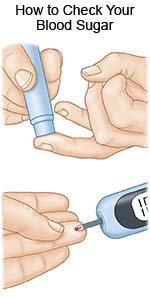Diabetic Ketoacidosis in Children
Medically reviewed by Drugs.com. Last updated on Aug 4, 2025.
AMBULATORY CARE:
Diabetic ketoacidosis (DKA)
is a life-threatening condition caused by dangerously high blood sugar levels. Your child's blood sugar levels become high because his or her body does not have enough insulin. Insulin helps move sugar out of the blood so it can be used for energy. The lack of insulin forces your child's body to use fat instead of sugar for energy. As fats are broken down, they leave chemicals called ketones that build up in the blood. Ketones are dangerous at high levels.
Common signs and symptoms include the following:
Your child may feel very thirsty, and urinate more than usual. He or she may have a fever. He or she may also have any of the following:
- Dry mouth, eyes, and skin
- Fast, deep breathing
- Faster heartbeat than usual for your child
- Abdominal pain, nausea, and vomiting
- Fruity, sweet breath
- Mood changes and irritability
- Feeling very weak, tired, and confused
- Weight loss without trying
Call your local emergency number (911 in the US) for any of the following:
- Your child has a seizure or becomes unconscious.
- Your child begins to breathe fast, or is short of breath.
- Your child becomes weak and confused.
Seek care immediately if:
- Your child is more drowsy than usual.
- Your child has severe, new stomach pain, or is vomiting.
Related medications
Call your child's diabetes care team provider if:
- Your child has fruity, sweet breath.
- Your child's blood sugar level is lower or higher than you were told it should be.
- Your child has a fever or chills.
- Your child has ketones in the blood or urine.
- Your child is more thirsty than usual.
- Your child is urinating more often than he or she usually does.
- You have questions or concerns about your child's condition or care.
Treatment
may include medicine to decrease the amount of sugar in your child's blood. Medicine may also be needed to treat the cause of high blood sugar levels. This may include antibiotics to treat a bacterial infection. Your child may need the following:
- Insulin decreases the amount of sugar in your child's blood.
- Give your child's medicine as directed. Contact your child's healthcare provider if you think the medicine is not working as expected. Tell the provider if your child is allergic to any medicine. Keep a current list of the medicines, vitamins, and herbs your child takes. Include the amounts, and when, how, and why they are taken. Bring the list or the medicines in their containers to follow-up visits. Carry your child's medicine list with you in case of an emergency.
Treatment options
The following list of medications are related to or used in the treatment of this condition.
Help prevent DKA:
The best way to prevent DKA is to help your child control his or her diabetes. Ask your child's healthcare provider for more information on how to manage your child's diabetes. The following may help decrease your child's risk for DKA:
- Monitor your child's blood sugar levels closely. Your child's levels may go up if he or she has an infection, is stressed, sick, or has a trauma. Check blood sugar levels often. You may need to check at least 3 times each day. If your child's blood sugar level is too high, give him or her insulin as directed by the healthcare provider.

- Manage your child's sick days. When your child is sick, he or she may not eat as much as usual. You may need to change the amount of insulin your child gets. You will need to check your child's blood sugar level more often than usual. Make a plan with your child's healthcare provider about how to manage your child's diabetes when he or she is sick.
- Check your child's ketones as directed. Follow your child's healthcare provider's instructions about when you should check your child's blood or urine for ketones. You may be given a machine to check your child's blood ketones. Urine ketones can be checked with sticks you dip in your child's urine. Do not allow your child to exercise if he or she has ketones in his or her urine or blood. Exercise may increase the level of ketones in your child's blood or urine and cause dehydration.
- Know how to treat DKA. If your child has signs of DKA, give him or her more liquids that do not contain sugar, such as water. Give your child insulin as directed by the healthcare provider and go to the nearest emergency room.
Give directions to your child's school:
Make sure your child's teachers know he or she has diabetes. Provide written instructions about what to do if your child has symptoms of high or low blood sugar levels at school.
Follow up with your child's diabetes care team provider as directed:
Your child may need to return often for blood tests. Write down your questions so you remember to ask them during your visits.
© Copyright Merative 2025 Information is for End User's use only and may not be sold, redistributed or otherwise used for commercial purposes.
The above information is an educational aid only. It is not intended as medical advice for individual conditions or treatments. Talk to your doctor, nurse or pharmacist before following any medical regimen to see if it is safe and effective for you.
Learn more about Diabetic Ketoacidosis
Treatment options
- Medications for Diabetic Ketoacidosis
- Medications for Diabetic Ketoacidosis, in DM Type I
- Medications for Diabetic Ketoacidosis, in DM Type II
Care guides
Symptoms and treatments
Further information
Always consult your healthcare provider to ensure the information displayed on this page applies to your personal circumstances.
